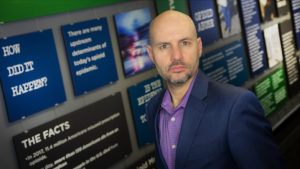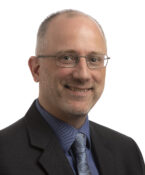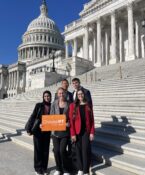HSC professor offers insights on reducing drug-related harms
- September 5, 2023
- By: Sally Crocker
- Our People
Related Links
Dr. Scott Walters, Regents Professor at The University of North Texas Health Science Center at Fort Worth’s School of Public Health, recently presented an online training for substance use providers through the Mountain Plains Addiction Technology and Transfer Center. “The Perfect and the Good: Engaging People around Harm Reduction and Non-Abstinence Based Goals” focused on ways to help people reduce harm from drug use, even if they are not ready to quit using drugs right now.
The ATTC Network is an international, multidisciplinary resource for professionals in the addictions treatment and recovery services field.
Established in 1993 by the U.S. Department of Health and Human Services, Substance Abuse and Mental Health Services Administration, the ATTC Network is comprised of 10 U.S.-based centers, two national focus area centers and a network coordinating office. Together, the network serves the 50 U.S. states, the District of Columbia, Puerto Rico, the U.S. Virgin Islands and the Pacific Islands of Guam, American Samoa, Palau, the Marshall Islands, Micronesia and the Mariana Islands.
Walters’ webinar focused on engaging and motivating people who are using drugs, wherever they are on the change process. He offered a set of practical strategies for reducing the negative consequences of drug use based on harm reduction. Harm reduction is a movement for social justice and health equity built on a belief in and respect for the rights of people who use drugs.
Harm reduction is challenging, Walters noted, because it must balance the welfare of the person with respect for the person’s individual autonomy.
“If people are ready to quit, that’s great,” he said. “If they’re not ready to quit, let’s find some strategies that will keep them safe until the next conversation tomorrow. You can’t just refuse to work with somebody because they’re not ready right now.”
It’s common, he explained, to suggest harm reduction strategies like using drugs in smaller amounts, not mixing substances, not using drugs alone — so someone is there to call for emergency assistance if needed — and having the Narcan overdose antidote available. Counseling strategies like motivational interviewing can increase a person’s motivation and commitment to using these potentially lifesaving strategies, while also helping them consider other changes in the future.
The specific harm reduction strategies might vary by person. Considerations can include the client’s interest and readiness, their level of use, any health or co-occurring conditions and local laws and regulations.
The “best” choice, Walters said, maximizes safety with the participant’s willingness to use the strategies.
Data from the NIH HEALing Communities Study/NIH Heal Initiative, an ambitious program for which Walters serves as the steering committee chair, has shown the community impact of geo-targeting 24/7-access Narcan boxes in high-need areas. Locations have included commuter train parking lots, motels, restaurants and retail stores, to improve the ability of bystanders to save lives.
ATTC works with a range of treatment providers in the parole system, through street outreach to those experiencing homelessness and through health care systems.
“Not everyone is interested in quitting right now,” Walters explained. “Offering drug safety strategies is like encouraging people to buckle a seat belt or wear a helmet while playing football. The goal is to help people avoid harming themselves or others while leaving the door open to larger changes in the future.”
“Just because you’re trying to use more safely, it doesn’t mean you can’t think about quitting at the same time,” he continued.
Engagement, he explained, is a prerequisite to working with clients. Many factors in a person’s history can affect engagement, such as trauma, experiences with law enforcement and other situations.
“Engagement is an interpersonal process that relies on respect, curiosity and careful listening,” Walters said. “It’s an ongoing process; building trust takes time.”






Social media